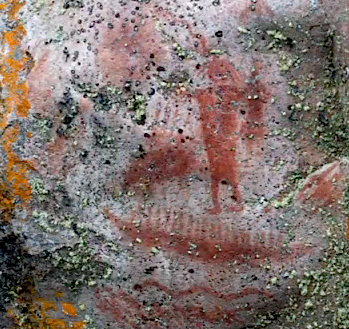This poetry collection, The Bone Weir by D.S. Stymeist, turned up in my Little Free Library a month or so back. While I did enjoy the book, I put in back out to share with another poetry-lover in the neighbourhood. A weir is a sort of dam, so one can envision a pile of fossils perhaps joining up with the raw material in a beaver dam (to go along with the general theme of the collection). I would say that the poems fall into three general groups: poems about "ancient times" with a bit of a focus on indigenous people living in the territory that became Canada, a series of poems about driving on the 401 in Toronto and poems about life in contemporary Northern Ontario. I'll take a quick look at one (or more) in each category.
"Pictographic" is an investigation of an ancient pictograph. Stymeist doesn't provide enough detail for me to narrow it down ton one location, but this one on Artery Lake seems like a reasonable stand in. (More information here on Anishinaabe pictographs.)
Stymeist mentions how the pictograph is fading: "Every year it becomes harder / to locate the old red image / amid rock cap moss and lichen. / ... / it has become a rusty smudge." Stymeist considers the pictograph as part of the animist tradition; this figure is part-man, part-rabbit: "We-sakejak. Great Hare, con-man, / trouble-maker, fool, and our hero." Europeans interpreted the long ears as devil horns "and barred their Cree guides / from setting up camp onshore." No question cultural misunderstandings are still rife in Canada. Incidentally, Free Wah has an entire book on his poetic reactions to pictographs, called simply Pictograms from the Interior of B.C., which is included in its entirety in Scree, The Collected Earlier Poems, 1962–1991. I don't think I'll have the time to do a decent review of Scree at the moment, but maybe later.
I naturally was quite interested in "The 401 Series," as I don't recall too many poems written specifically about that highway, running right through Toronto (though Raymond Souster surely has written a few...). It becomes immediately evident that he has nothing good to say about the highway and its maddening traffic. "Think not that you remain you / when behind the driver's wheel. / I've seen chamber maids, pastry / chefs ... / ... / ... consumed / by mind-rage of beltway and byway." In another section, he writes: "I can not avoid breathing this opiod fog. / ... the Four-O-One speaks to me / with maggoty tndrils of crosstown transit." It is hardly a surprise that Stymeist encounters a traffic jam: "Now we're all blocked u, backed up, with nowhere to go, it's the nightmare / of Santa Monica Xpressway all over again...". But then traffic starts moving again: "And, I can't believe it, we're moving again./ Oh sweet freedom! Oh sweet delight! / The open liberation of road gapes / before me as great flying beasts / wing their goony ways into Pearson...". There is not much to add. The 401 is often an unpleasant experience, but people still have organized their lives so they are reliant on it to cut across Toronto. As the mantra goes "You are the traffic;" it's not everybody else's fault that highways, such as the 401, are jammed. Stymeist seems to get this, not exempting himself from his jaundiced view of the 401, though as one point he does write "I feel not at all one with the road."
Perhaps not surprisingly, Stymeist does not seem at home in Toronto or indeed the GTA, and the rest of the poems are generally set in more rural locations ("Water Birds on the Rideau", "Tidal Pools", "Winter Bait"). In "Wild Geese" Stymeist hears the call of the geese as a siren's song. However, the geese "don't know that I can't / join them in the pale blue air" though he clearly longs to.
Even though he takes a largely negative view of the urban environment, I personally was the most interested in Stymeist's somewhat rare poems set in cities with the "The 401 Series" being the most on point. Clearly his interests evolve more around rural life, though it might be a stretch to tag him as an anti-urbsn poet.

No comments:
Post a Comment